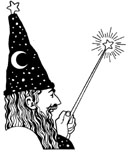
Quackery Reducks: A Discussion of Spiritual Consumerism in Post-Christian America
FRIENDLY GHOSTS, KARMIC REVENGE FANTASIES & COSMIC HAMSTER WHEELS
COVID-19 has the whole world debating how much the “experts” really know, and whether we should trust the talking heads or our gut instinct in dealing with the pandemic and everything falling apart in its wake. One thing, however, is certain: There’s a ton of opinion out there, and not all of it is correct. Mixed in with real information are a lot of spin and outright lies. The problem is: People today are perhaps more gullible than at any time in history and likely to believe just about anything.
Metaphysics deals with ultimate reality — God — but when we as a culture rejected God, we didn’t get the clean, businesslike, secular world we were expecting. Instead, we got a whole slew of fake metaphysics to go along with the phony physicians and fraudulent “experts.” Only one Man ever rose from the dead, but ever since we effectively shoved Him aside, we’ve subscribed to all manner of meager substitutes. The point? Without Christ, we are defenseless against those who would — and do — prey on our insecurities. We are all quacked up unless we learn the faith and live it again.
After Jason M. Morgan’s column “The Golden Age of Quackery” appeared in the NOR (Cultural Counterpoint, May), he and NOR editor Pieter Vree discussed just how much quackery there is in the world today. What follows is a transcript of that conversation.
Pieter Vree: Jason, I’ve been having Baader-Meinhof moments since reading your column. Once you see quackery in one place, you start seeing it everywhere! Just the other day I was flipping through an issue of Harper’s when I came across an article about a new men’s movement. Called Evryman, it’s partly a response to #MeToo and partly an attempt to address “toxic masculinity” by getting men in touch with their emotions, but in a feral, berserker kind of way. Evryman puts on three-day retreats, and writer Barrett Swanson attended one at a woodsy lodge somewhere in the Midwest. Allow me to read you a passage.
You May Also Enjoy
Review of The Unreality Industry
The Astros' systematic cheating vitiated the sanctity not only of the game of baseball but a core feature of American identity.
They represented a variety of denominations but expressed a remarkably similar prescription for living spiritually in the wider world.

